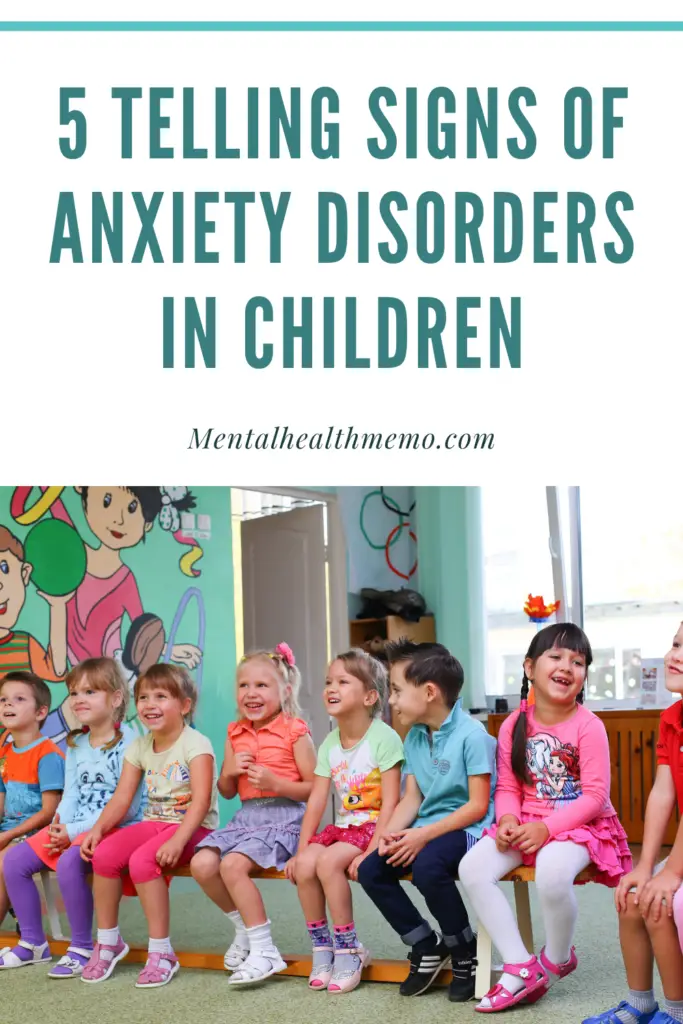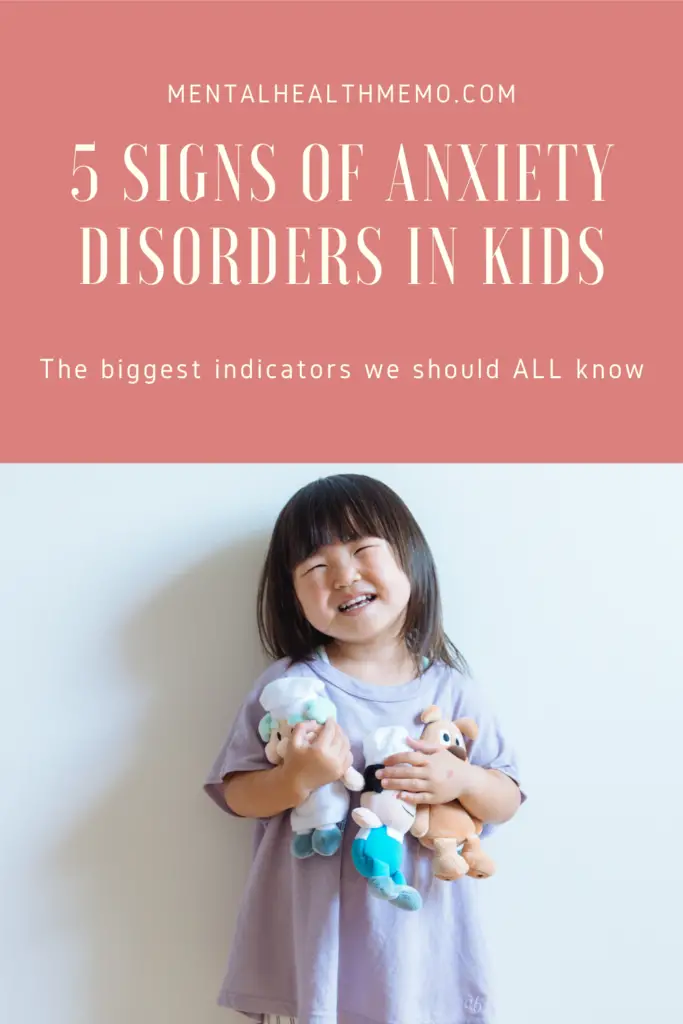Table of Contents
Why Knowing About Anxiety Disorders in Children Matters
Hi pals and welcome to this week’s post!
If any of you have read my Personal Journey with Anxiety article, you’ll know that I have experienced anxiety since I was a child.
But what I always find interesting is that at the time I was too young to understand such a complex phenomenon, and so my anxiety came forth in other ways.
Only after identifying my disorder and getting help did I realize it was my anxiety disorder the whole time.
I thought that it was just me that went through this, but after studying developmental psychology in children and talking to others, I noticed a lot of patterns.
That is why I wanted to write a really important post about the signs of anxiety disorders in children.
You do not need to be a parent to care about this topic. We all have little cousins, siblings, nieces, nephews, or maybe we even work with kids.
So it’s an important topic we need to make ourselves aware of because the sooner we can intervene and help, the better off that child will be.

Sign 1: Stomachaches
This is one of the most common signs of anxiety disorders in children.
It was also a HUGE one for me as a kid. My stomach was ALWAYS hurting whenever I had to go to school, a friend’s house, or leave home. And it was such a prominent problem that I ended up missing almost a year of school when I was 8.
And this physical response is experienced by everyone that is nervous and it makes sense.
Imagine you have to do a presentation at work with the boss of the company being present. Likely your stomach is a bit upset, you’re getting butterflies, you have no appetite, or you have to use the washroom. That’s a normal stress response! And it can actually help us perform better.
But the problem is when this stress response(and thus stomachache) remains consistent and happens with things that probably should not elicit such a reaction.
So yes, your child being nervous and their tummy hurting on the first day of school is normal.
But if they complain about a stomachache all the time (and it isn’t due to something physical), or they never have one when they’re at home with you, then it may be a sign that your child is anxious.
The key part here is that they’re getting these stomachaches frequently and it’s not due to something like a presentation, first day of school, a classroom switch, or anything of the sorts.
Instead, they have these stomachaches consistently when they’re out and not when they’re in places they consider “safe spaces” like your house or their grandparents’ house.
**Tips for improving anxiety disorders in children**
Talk to the child!
Ask them when they feel like their tummy tends to hurt, or if they can think of a reason for why it does. (For example, maybe they’re not anxious but are being bullied at school).
Try and get as much information out of them as possible, but be understanding that they may not know what’s happening either. (I sure as hell didn’t).
Once they’ve told you what they can, SUPPORT THEM. Let them know you’re not upset, that you’re thankful they told you, and you’re there to help them. Follow up with them on the daily, and try to figure out what’s happening.
Sign 2: They’re Attached to an Object
When dealing with anxiety disorders in children, there’s something called a “grounding object”. This is a physical thing that has emotional value to a person, So when they have it with them, they feel calmer.
An example is a teddy bear, a blanket, mom’s sweater, a lunchbox, really ANYTHING that reminds the person of home & safety.
(Please note adults can also have grounding objects. They’re not necessarily a bad or childish thing if used in a healthy manner).
So because this object has such emotional importance to the child, if it’s taken away the results are ugly.
In children this looks like crying, tantrums, not letting anyone touch or take away the object. Basically getting VERY distressed if this object is compromised in any way.
Now of course this type of attachment can also be normal (especially in newborns), but again, it’s about how constant it is and how bad the response is.
If Sammy loves her teddy because grandma gave it to her for her birthday so she doesn’t like people playing with it but she doesn’t need it with her all the time and functions fine if teddy isn’t there, that’s normal.
If little Billy won’t go ANYWHERE without his blanket, clings to it for dear life when not at home, and starts uncontrollably crying when his friend touches it, there may be a problem.
Also, please note that YOU may be the grounding object. That’s why Separation Anxiety exists.
This is common around the age of 1, and then sometimes it pops up again at ages 3-5. But if your 8-year-old is still crying at the top of their lungs when you leave, it could potentially be a sign of anxiety.

**Tips**
Grounding objects can be really tricky because taking it away forcibly can traumatize the child so NEVER DO IT.
Also, if the child is having a hard time going out as it is, the grounding object can act as a security blanket (no pun intended) for them. That way they can actually go to school, daycare, or wherever kids go.
So I’d say it may be better to just let them have that object for the time being, and simply keeping an eye on the progression of the attachment.
Or, try and gently encourage them to slowly let go of their attachment to the object by working on it slowly, gradually, and in relatively safer spaces for the child (don’t take their blankie away immediately while they’re going to school. Instead, maybe ask them to leave it for an hour while at their friend’s house).
Sign 3: Nightmares & Wetting the Bed
Having consistent nightmares and wetting the bed can actually be a sign of a few different things, so I can’t say that this solely indicates anxiety.
But what I can say is that it’s abnormal, and you should take it seriously.
Again, all of these things can be normal to an extent. So yes, kids do often get nightmares and they can continue to wet the bed for a long time.
But keep an eye on how much it happens, and if there are other behaviors your child is presenting (like the ones on this list) to indicate that something’s wrong.
**Tips**
Please be kind to your child when they do this. I know cleaning the bed all the time sucks and you want to sleep, but they’re likely scared out of their little minds.
While their memory is still fresh ask them what the nightmare was about, what they were feeling, how they felt before they went to bed etc.
Getting as much information from your child is going to make figuring things out much easier since you have more to go off of. You may also notice patterns that way.
Sign 4: “I’m Scared”
Often anxiety disorders in children translate into fear. So pay attention to what your child says.
For me, it was always “My stomach hurts” or “I’m scared, I don’t want to” because as a child, I understood anxiety as fear.
I had no idea why but I was just terrified about going to school and my stomach would hurt really badly every time I had to.
Or I didn’t want to go to a friend’s house because I just felt scared about it.
I didn’t understand what anxiety was, but I understood fear.
So look for fear words and behaviors in your child that are consistent and have a pattern.
For example, I never showed fear behaviors when I was at home playing by myself because that was my safe space. But at school it was always stomachaches, hiding away, going home early, etc.
Patterns are key.

Sign 5: Isolation
This can also be related to other mental disorders but is still something to look out for in relation to anxiety.
Social anxiety is not an adult-exclusive phenomenon. Children can absolutely have it (I did). The tricky part is that it’s really hard to tell whether a child is just shy or if they’re actually experiencing anxiety from social interaction.
Or, the child may not be shy at ALL and be having anxiety but not showing it.
**Please note that Social Anxiety DOES NOT always equal being shy or having poor social skills. It’s the fear of being judged by others & embarrassing yourself. Therefore you are often hyper-conscious and feel anxious in social settings. Because you’re anxious you avoid those situations, hence creating potential poor social skills and/or a shy personality. You can be the most charismatic person on the planet but still have Social Anxiety**
So figuring out what’s going on at such tender years can be a struggle. But it is definitely something to keep an eye on if you’re concerned about your child’s mental health. Isolation is an abnormal behavior for sure.
**Tips**
Trying to force your kid into social situations when they’re clearly not ready is likely to make them WORSE, NOT BETTER. Gently push them to do it and be supportive of them when they aren’t able to. But continue to encourage them to do it.
There is nothing worse than being made to feel bad and ashamed for something out of your control. Especially as a child when you’re already not understanding your feelings very well.
Treat kids the way you wish an adult had treated you as a child.

Final Thoughts
Anxiety disorders in children can start presenting themselves early on.
I think it’s incredibly important for us all to be able to identify potential abnormalities in our youngest generations so that we can help them immediately.
They are, after all, our future.
All my love,
T


So informative! 🙂
Thanks! I’m glad you enjoyed it! 🙂
Very informative!